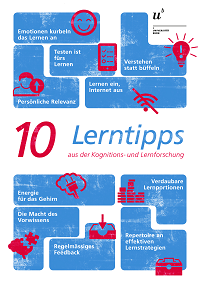Study successfully - with the LearningToolKit
How can I learn successfully? And how do I organise my studies optimally? The LerningToolKit will tell you! You will find helpful materials and videos on the following topics:
- Learning and reading strategies
- Time and stress management
- Motivation and organisation
- Mental health
In a nutshell

The 10 most effective learning tips
In the flyer, the ten most effective learning tips are summarized briefly and concisely. You can download it as a memory aid.
Videos with tips for learning and studying
In the videos, you will get to know more learning strategies, receive recommendations for successful studying and other helpful tips on central topics of student life.
Strategies & tipps for successfull learning
Making optimal use of lecture recordings
Lecture recordings offer you a double benefit. You can catch up on lectures you couldn't attend or review lectures you attended. Watch our video to learn how to get the most out of them.
Source:
Nordmann, E. et al. (2018). Lecture capture: Practical recommendations for students and lecturers. Preprint: https://osf.io/esd2q/
Learning strategies & background knowledge
In the videos you will learn about further learning strategies and learning tips, the effectiveness of which have been empirically proven. You will also receive central background information on the topic of learning.
AHA: Tips for successful studies
Short videos with sound and practical tips for successful studies - "aha!" moment guaranteed.
Short Videos: Learning, Mental Health, Time & Stress Management
In short videos, learning expert Dr. Barbara Studer, lecturer at the Institute of Psychology at the University of Bern, provides helpful tips for students. Videos on the following topics have already been published:
- Learning & examps: go to the videos
- Time, energy & stress management: go to the videos
- Mental health: go to the videos go to the videos
- For a fit brain: go to the videos
Counseling and support
The Universities of Bern Counselling Centre has a wide range of information materials, training opportunities and consultations on the topic of studying, learning and memory.
Universities of Bern Counselling Centre
All offers are free of charge for students of the Bernese universities. Benefit, for example, from professional learning coaching or get tips and strategies for your studies and career transition.
You can find more information and other services and offers on the website of the Counselling Centre.
